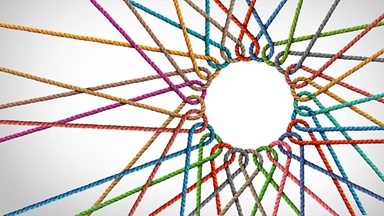Loading component...
At a glance
After a prolonged pandemic-induced hiatus, in-person events and associated networking opportunities have returned. Yet it’s likely not everyone is thrilled about this.
“Many people dislike being in a networking environment, mainly because they're fearful of being surrounded by sales-type people,” says David Simpson, managing director of Melbourne HR.
“The best thing you can do is [to] not be like that. But it is OK to be strategic about who you would like to speak to,” he says.
Mike Davis, head of strategic partnerships and communications at technology social enterprise Infoxchange and chief podcaster at Humans of Purpose, agrees that “networking” has become a dirty word.
Fortunately, there are ways to prevent it from feeling transactional. Be authentic and don’t put any pressure on yourself. Networking is about laying the groundwork for something that may materialise in the future.
“When I go to conferences, I don't think to myself, ‘I'm going to do networking’. I'm going to be myself. I’m curious and interested in other people, and I’m interested in building career-relevant relationships,” says Simpson.
Simpson has scant regard for an approach to networking that involves working a room to amass as many contacts as possible or being driven purely by the perceived prestige of having a particular person in their network.
“They collect contacts like Pokémon trading cards,” he says.
“Take a quality over quantity approach, but don't let that be an excuse not to do any networking.”
Be a networking giver, not a taker
For Davis, the No. 1 rule is not to ask someone for something during that first meeting, as it smacks of being an opportunist.
The best mindset is to focus on what you can offer that is of value to the person to whom you are talking. It could be your experience, insights, learnings or “war stories”.
As bestselling workplace author Adam Grant says, “Be a giver, not a taker”.
“When you're earlier in your career, it’s about asking a lot more questions and listening. When speaking with someone much more senior, those old school values of respect and deference will go a long way,” says Davis.
Both workplace experts stress that there is no substitute for in-person networking.
Davis believes that every mutually beneficially professional relationship includes a positive in-person interaction early on.
“We need to share a space with other people to build that kind of neurochemical trust chemistry,” he says.
“You also miss out on 70 per cent of the body language, which informs what they are saying. I know that people have Twitter and LinkedIn friends, but I think it’s a bit transactional.”
Career development: CPA Australia Mentoring Program
Find a mentor
Ask a successful businessperson what contributed most to their achievements, and they will likely start talking about a mentor they once had.
The benefits of mentors are manifold: they can serve as a confidence boost, a sounding board, a technical skills coach or a teacher of soft skills.
Networking is an effective way of meeting prospective mentors. However, before approaching someone with a request, carefully consider the type of support you need.
“A good mentor will want to know what you're looking for,” says Davis. “It will reflect poorly on you if you don’t know what your priorities are.”
Look for a mentor who is inspiring and has demonstratable career achievements, adds Davis.
“Look for someone you admire, and who has gone down the road that you would like to go down. And think carefully about whether the person has enough time to invest with you.”
Ideally, your mentor will work at the same organisation. A mentor from a direct competitor is a no-go, as it will make others uncomfortable, including your managers.
There are other reasons to look for someone from within your organisation – not least of which is the logistical ease of meeting up.
“Mentorships and networking can go hand-in-hand, so if you work hard and you're achieving good things, your mentorship can effectively give you someone who champions you within the business,” says Davis.
“That can assist you with accelerating your career.”
“A helpful guide” to mentoring
While it is important to have a mentor you get along with and feel comfortable around, it pays to give priority to the person’s skills and achievements over their personality. Someone different from you is more likely to challenge your thinking.
Davis is a mentor at the Start Space mentoring program, which is funded by the State Library of Victoria. He mentors two budding entrepreneurs with whom he meets up fortnightly.
“They are people with great ideas and big dreams, but they are not well funded and lack some experience to guide them in their journey. That's where mentoring comes in: it’s like being a helpful guide,” he says.
Davis has helped his mentees use their time more effectively and to identify the conditions when they are performing at their best.
“We look at exercise, sleep routines, when they do their most productive work, how they are managing emails, their goals and setting expectations.”
For Davis, the benefits of the mentoring relationship goes both ways.
“I find that younger people have very different ways of solving problems, and that's exciting. I also mentor an older person and he thinks completely differently to me, which I find refreshing.”

